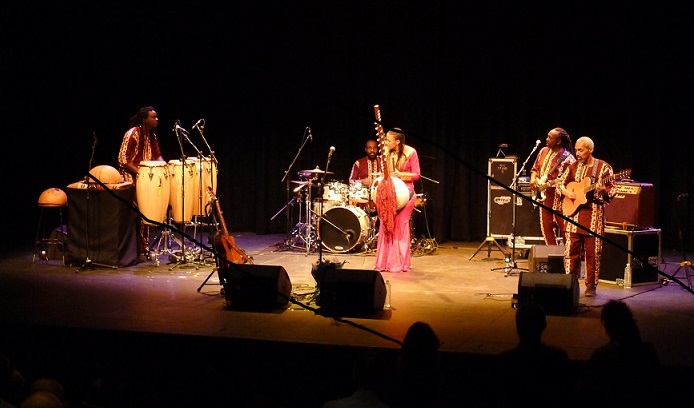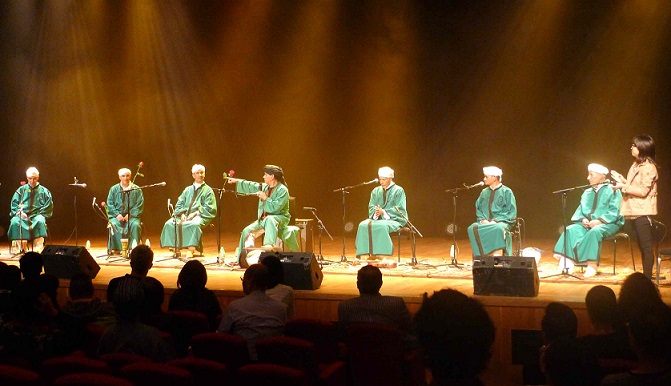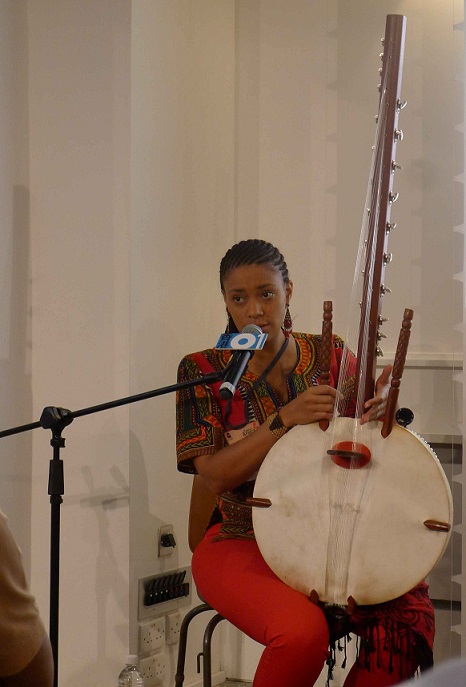藝評
洋溢生命力的非洲 | Life-affirming Africa
約翰百德 (John BATTEN)
at 3:21pm on 21st November 2017



圖片說明 Captions:
1. 素娜.祖巴特聯同樂隊於香港大會堂演奏非洲豎琴
Sona Jobarteh playing the kora and band at City Hall, Hong Kong
2. 酋酋卡樂師在香港大會堂舉行音樂會後回答觀眾的問題,2017
The Master Musicians of Jajouka answering questions after their concert at City Hall, 2017
3. 素娜.祖巴特在灣仔HK01空間示範非洲豎琴
Sona Jobarteh demonstrating the kora at HK01 Space in Wan Chai
(Please scroll down for English version)
在我的外遊回憶中,最冷的一次經驗是在摩洛哥亞特拉斯山脈的巴士旅程。那輛搖晃不定的巴士,車身地面上有很大的縫隙,冰冷的風雪就在那裡漏進車廂、不停旋轉。我們在太陽下山前在山上的村落停下,巴士乘客與村民一同在路邊大樹下臨時架起的餐桌,一同品嚐「harira」,一種以扁豆和蕃茄煮成開齋節湯羹。遙遠的鈴聲響起,意味太陽已西下,我們分享用餐:美味、暖身的湯羹慢慢取代了旅程的寒意;安全的路邊站令人心感安慰,令人彷如置身跨越時間的商隊旅館。
那是1991年的冬天,科威特與伊拉克正爆發第一次波斯灣戰爭,伊拉克不時向沙地阿拉伯和以色列發放飛毛腿飛彈。雖然摩洛哥與戰地相距甚遠,遊客也不再前往,街上盡是顯而易見的愁雲慘霧。只是一個星期前,在那個通道交錯得像迷宮一樣的奇妙中古城市非斯,一家酒店遭炸彈襲擊,20名旅客身亡。連那些臭名遠播,在當地貪婪地兜攬生意,滋擾地哄騙要成為你的嚮導、向你出售地氈或提供旅客不需要的任何服務人士,也在保持距離:不要被看到與外國人一起,否則會引起麻煩。
人們常說我們現在所生活的世界問題多多。但歷史所顯示的卻非這樣:世界一直都面對接二連三的戰爭,有個人、經濟、政治、軍事、意識形態、內戰、宗教、領土、環境或不同世代的戰爭。人道主義者史提芬.平克在他的暴力歷史著作《人性中的善良天使》指出,我們現時身處的時期,很可能是最和平的時代。
就在不久以前的1986年,菲律賓的「人民力量」革命推翻了獨裁者馬可斯,在世界各地引發了類似的反對行動和改變。柏林圍牆倒下、東西德統一、民主與言論自由再臨東歐,還有繼蘇聯瓦解後,產生了多個新獨立的中亞國家。連最終以北京屠殺災難告終的1989年中國學生運動,也迫使中國推行經濟開放,結果令數以百萬計的人民走出貧困。在非洲,利比利亞、安哥拉和莫桑比克的內戰結束後,南非也和平地廢除種族隔離政策,盧旺達在種族清洗的恐懼過後出現了嚴格政府管控,非洲也首次得到相對穩定。
如果世界令人覺得比此前的時代更危險,可能因為我們經歷有限而歷史記憶較短,還有互聯網近年泛濫的資訊令發佈「有圖/有片有真相」的壞消息變得太容易。這種「現實」可以輕易地由任何人以社交媒體建立。即使沒有個人參與,這類壞消息––應該只視為接收的知識(和任何其他像閱讀般學習而來的知識一樣)––結果成為了一種帶有毒性的共有經驗,被故事火熱程度又或被分享次數的報告誇大其事。這些都只是隨意數字,無法反映當今世界情況。
康樂及文化事務署每年舉辦的世界文化藝術節最近圓滿結束,本年以非洲為焦點,時間可說十分合適,因為非洲是一片鮮被香港人想起的廣闊土地。文化節選演的節目為觀眾帶來一系列別具新鮮感的舞蹈、歌劇、話劇和音樂演出。酋酋卡大師樂隊來自摩洛哥位於地中海附近的里夫山(亞特拉斯山脈的北面),他們在音樂會上演奏令人入迷的蘇菲派音樂。傳統上,這種節奏音樂在摩洛哥國王的宮廷上演奏,至今仍然繼續在宗教節日中出現,令人聯想到與神接近的感覺。文化節的另一個音樂會由素娜.祖巴特和她的樂隊呈獻,他們演奏西非的音樂,傳統上由世襲的吟遊詩人樂師演出。祖巴特是一位傑出的先鋒人物,因為她是首位彈奏這種複雜的21弦樂器。非洲豎琴傳統上只由男性彈奏、以姆指和食指操作,聲音與豎琴相近。
在文化節安排的一場講座中,祖巴特解釋把女性排除於吟遊詩人音樂以外並不是性別歧視,而是因為各族古時在狩獵覓食和音樂上的角色,只由男性擔任,目的是「回饋森林,並在獵殺動物時讓幽靈鬼怪平靜下來。女性是生命給予者,不應該與殺生扯上關係,所以傳統上沒有成為樂師。」祖巴特也表示,音樂反映社會,而那些角色正於現代世界中改變。
美國明尼蘇達州麥卡萊斯特學院音樂系主任、副教授黃泉鋒對音樂的環球化及國際音樂表演有這樣的看法:「……蘇菲風格既神聖又流行的現代曲風,淡化了宗教與世俗之間的差異。然而,像酋酋卡大師樂隊等樂師所達成的,是創造音樂空間,邀請樂迷以多元角度追尋自己的信仰,翻越種族和其他傳統枷鎖踏上靈性旅程。」這兩場音樂會正正做到這點––來自非洲及時、真實、洋溢生命力的訊息。
原文刊於《明報周刊》,2017年11月25日
Life-affirming Africa
by John Batten
Of my travel memories, one of the coldest is of a bus trip over the Atlas Mountains in Morocco. The rickety bus had large gaps in its floor and the icy winds and snow swirled through and around the cabin. Then, we stopped at a mountain village just before sunset and the bus passengers joined the villagers on makeshift trestle tables under roadside trees and were served harira, a thick lentil and tomato soup, to break the Ramadan fast. A distant bell signaled that the sun had set and we tucked into a shared meal: the delicious body warming soup slowly replacing the cold of the journey, and the comforting feeling of being in a safe roadside station, a timeless caravanserai.
It was winter 1991; the first Gulf War was being battled in Kuwait and Iraq, and SCUD missiles were regularly being launched by Iraq on Saudi Arabia and Israel. Although Morocco was far from the war, tourists had stopped coming and there was visible apprehension on the streets. Only a week before in Fes, that wonderful medieval city of labyrinthine passageways, a hotel had been fire-bombed, killing 20 tourists. Even the local rapacious touts, infamous for their annoying cajoling to be your guide, sell you a carpet, or provide any service a tourist may not need, kept their distance. They had been warned: don’t be seen with foreigners, it might arouse trouble.
We hear, often, about the problems the current world is in. But history indicates otherwise: the world is always an uneasy flux of battles, whether it is personal, economic, political, military, ideological, civil, religious, territorial, environmental or inter-generational. The humanist Steven Pinker in his history of violence, The Better Angels of Our Nature, argues that our current era could possibly be the most peaceful.
And, it was only a short time ago that the 1986 ‘people power’ revolution in The Philippines overthrew the dictator Ferdinand Marcos, trigging a wave of similar protests and change worldwide. The fall of the Berlin Wall, German reunification, the return of democracy and freedom of speech in Eastern Europe, and the breakup of the Soviet Union resulting in a swathe of newly independent Central Asian nations. Even the 1989 student-initiated protests in China that ended in the disastrous Beijing massacre forced the country’s economic liberalization resulting in millions emerging from poverty. And in Africa, relative stability is experienced for the first time in generations after the ending of civil wars in Liberia, Angola and Mozambique, the peaceful abolition of apartheid in South Africa and strict government control in Rwanda after the terror of inter-tribal ethnic-cleansing.
If the world feels more dangerous than previous periods of time, it could be because our experiences are limited and memory of history is short and the recent proliferation of information on the Internet allows too-easy dissemination of bad news supported by the ‘evidence’ of graphic images and videos. This ‘reality’ is easily created by anyone using social media. Even when there is no personal involvement, such bad news - which should only be appreciated as any other received knowledge (such as that read in a book) - instead becomes a toxic shared experience, exaggerated by reports of the ‘trending’ of a story or the number of ‘shares’ generated. These are arbitrary numbers reflecting nothing of the present state of the world.
The recently concluded World Cultures Festival organized yearly by the Leisure & Cultural Services Department focused this year on Africa. This was timely as Africa is a sizable part of the world rarely considered in Hong Kong and the programming was a fresh variety of dance, opera, theatre, and musical performances. From the Rif Mountains near the Mediterranean (well north of the Atlas Mountains) in Morocco, The Master Musicians of Jajouka played a concert of their hypnotic, trance-inducing Sufi music. This rhythmic music was traditionally played in the courts of Moroccan kings and continues still at religious festivals to induce a feeling of being close to God. Also heard at the festival was a concert by Sona Jobarteh and her band playing the music of West Africa, traditionally only played by the griot, hereditary musicians. Jobarteh is a remarkable pioneer as the first woman to play the complex kora, a 21-string instrument that emits a harp-like sound and is played with both thumbs and first fingers and traditionally only by men.
In one of the arranged talks during the festival, Jobarteh explained that it was not sexism that excluded women playing griot music, but because of ancient roles when tribes hunted for food and music was only played by male hunters to “give back to the forest and appease the spirits when hunting and killing animals. Women, as givers of life, should not be associated with killing, so traditionally they have not been musicians.” But, Jobarteh said, music reflects society and these roles are changing in the modern world.
Wong Chuen-fung, Chair of Music at Macalester College in the USA, writes that with globalization of music and worldwide concert performances “…Sufi-styled global pop songs have blurred the differences between the sacred and the secular, the private and the public. Yet what musicians such as the Jajouka masters have achieved is the creation of a musical space that invites pluralist devotional pursuits and spiritual journeys across ethnicities and other pre-modern boundaries.” These two concerts did exactly that – an opportune, real, and life-affirming message from Africa.
This opinion piece was originally published in Ming Pao Weekly on 25 November 2017
